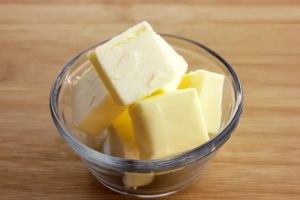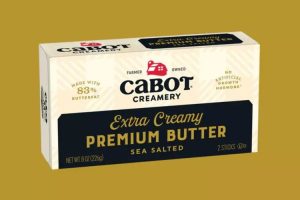
We grow up listening, seeing, touching and breathing from the direct or subliminal “communication cosmos”, that everything vegetal is healthier, better, and more everything that is good, in contrast to the animal, which is painted as the worst of all. (it doesn’t matter if it’s not true).
It is surprising that this is not so. So today I am going to talk to you about butter and margarine, so similar in appearance and so different in essence, and we are going to discover together some things that you did not expect.
Although they look the same, the differences are significant:
Butter comes from the fat of milk of animal origin, it is obtained by separating its solid components from the liquid, when whipping the cream. Margarine, which was created as a substitute for butter, is made from different types of vegetable oil fats.
Fats are not the same either: butter contains saturated fat and cholesterol; Margarine, as it comes from vegetable oils, contains mono- and polyunsaturated fats.
Margarines used to have high levels of trans fat, which dealt a double whammy for heart disease by raising bad cholesterol (LDL) levels and lowering good cholesterol (HDL) levels.
For a long time, margarine was thought to be healthier because of its lower saturated fat content, and because it has the vegetable blessing. However, high levels of trans fats were detrimental to heart health.
Nowadays, some margarines have reduced their trans fat content and are low in saturated fat and high in unsaturated fat, but specialists avoid claiming that they are healthier than butter and as with everything, if consumed in moderation none of the margarines two of us are going to kill us.
Which is the best and why butter?
Butter provides important antioxidants such as vitamins A, D, E, and selenium; and is a source of minerals such as Manganese, chromium, zinc and copper, among others.
It is also a source of vitamin K2, essential to prevent arterial calcification, prevent cavities and strengthen bones.
It contains fatty acids and nutraceutical substances: lauric and palmitic acids, which are anti-inflammatory and antioxidants, especially at the intestinal level.
It provides lecithin, key for the brain and immune system, and contains CLA (conjugated linoleic acid), useful for weight loss and with anti-cancer properties.
Arachidonic acid is important for the brain and glycosphingolipids are essential for the immune system of the digestive tract.
For joint health, it has wulzen factor, which helps prevent arthritis and stiffness.
For the thyroid, butter provides highly bioavailable iodine that promotes the proper functioning of the metabolism and prevents hypothyroidism problems.
Up to this point, we felt like going to buy butter in bulk. But be careful! Because all these properties come accompanied by calories and cholesterol, which does not make it a bogeyman: we can spread it on our toast without guilt, and dip it into popcorn, but limiting the portions to the recommended daily values.
Consuming dairy products, ALWAYS, is good!
Valeria Hamann























